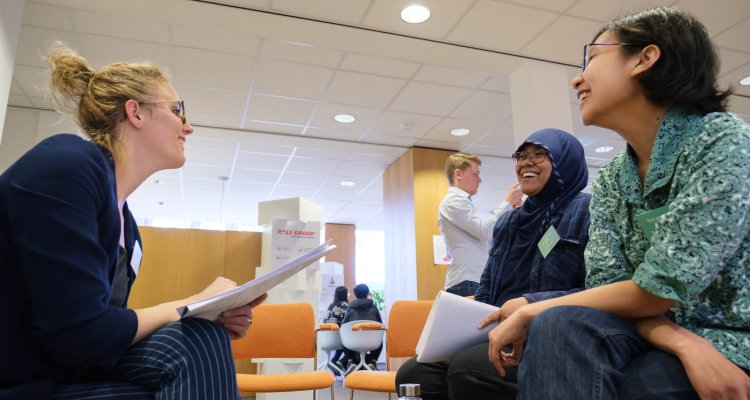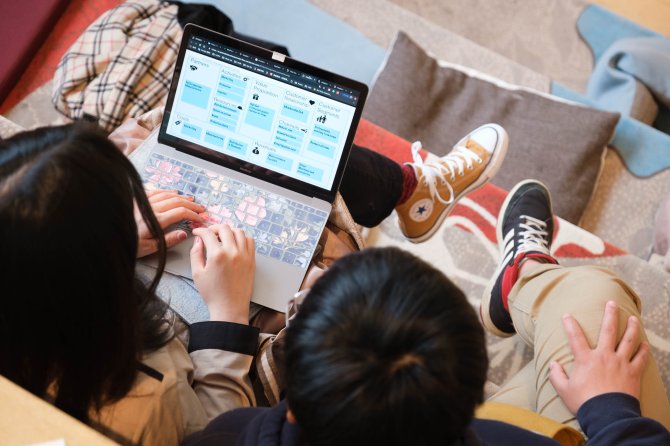
News
Discussing our zero waste future with student innovators during the ReThink Waste Challenge
The student teams competing in the ReThink Waste Challenge have received essential advice from industry experts. It has taken their ideas to the next level by honing in on the essence of their innovation, challenging them to communicate their ambition or even pushing them to change direction. Meet some of the students and their coaches and learn about their experience during the Challenge.
Central to the WUR's Student Challenge philosophy is bringing together academic and industry experts with prospective innovators: the students competing in the Challenge. The ReThink Waste Challenge is no different. The student teams—hard at work to present the ideas that will chime in the zero waste future our planet needs—have met with several coaches out of the partner network. The feedback they gather this way, will be pretty important, because the second milestone of the Challenge is looming up ahead. This second and last selection moment will determine which teams will compete in the Grand Finals, for the chance to win € 6.000 and further coaching, with the goal to make their sustainable business plan a reality.
Explain how it works
Marco Nieto Lojo of Team ElectOlive was activated when the Universidad de Santiago de Compostela encouraged its students to compete in the Challenge. “I immediately contacted my brother, Anxo. He started working on the economic side of the concept, together with his friend Larisa. Miriam, an old friend and a biologist, agreed to work with me on the research side of the project. I study biochemical engineering myself.”
I served as a reality check for the students, while they gave me a fresh perspective.
So what are these four students working on? “We want to turn waste into electricity. Electricity is already important, but it will surely become more important in the future. We’re focusing on organic side streams of the olive oil industry, right now, proposing ways in which the industry could turn those into energy.”
“The olive oil industry produces enough suitable biomass for our concept, but our concept will be suitable to different industries.” The coaches the students spoke, honed in on their numbers and asked about their calculations. Could they really produce those amounts of energy? “We’re pretty confident,” says Marco, “but we did listen to their comments.” The team realized they should think about where those questions came from. “We’ve made it a point to explain ourselves better, so interested parties will not only know that our idea works but also how it works. It’s up to us to communicate our confidence.”
Find the essence of your innovation
“Focus, focus, focus — that has been my number one advice,” says Heiko Oertling, R&D hub manager for CJ CheilJedang, a leader in Korea’s food industry. “Some teams get distracted by complexity or expanding their idea. From my experience in innovation, usually it is beneficial to hone in on the strength of a core idea. You need to find the essence of your innovation—that is it what you’re selling in the end.” He emphasizes that a main skill in innovation is curation. “You need to filter the insane amount of information everyone has access to.”

“CJ CheilJedang is a major distributor and manufacturer of Asian food, with an extensive portfolio of items and ingredients.” Heiko is a chemist by training but has experience in many different areas from supply chains to innovation. “What drew us to the ReThink Waste Challenge was the chance to meet new minds. Our daily work is very often, unsurprisingly, concerned with everyday´s harsh reality. My conversations with the student teams have been about the future.” He described those meetings with the word ‘friction’. “I served as a, sometimes unpleasant, reality check for the students, while they provided me a fresh perspective.”
“I think it’s really important to connect with the next generation,” Oertling says. “I personally love to see how far the teams can take their ideas.”
Change direction if necessary
The focus that Oertling advises can also lead student innovators to discover not the essence of their current project, but a new direction. “Our project went through a couple of iterations, but we started out interested intreatingdigestate,” tells Daniel Balutowski of Team Waste^2. “Digestate is a liquid waste product of biofuel production—a kind of waste of waste, hence our teams name.” The team wanted to use hydrothermal carbonization to turn this problematic by-product into a new solid and liquid energy stream, both of which provide green alternatives to the current situation.
I want to get to know there young innovators, but also: I want them to get to know IFF.
“The coaches were really knowledgeable and helpful,” says Daniel Loreggia, a member of the same team. “They kept us focussed on the overarching details. Is this doable, not just economically, but chemically as well?” So the team dove in. “Going deeper and deeper into our proposition, taking the Dutch context into account as well, our initial idea, we concluded, didn’t work thermodynamically,” explains Balutowski. Using a water based processing method initially made sense, but the outputs werecontradictory when considering the carbon balance. “So we took a step back.”
“We did the work and started looking at, for example, chicken manure,” explains Balutowski. A hot topic in the Netherlands, manure, as it is tied up with problems surrounding nitrogen emissions. “Our current proposition is a technology that creates biochar out of excess manure.” This is a very useful product, that could be applied to soil to store carbon, reduce emissions, and help retain water and nutrients.
Create an attractive proposition
“IFF’s reason to partner with the ReThink Waste Challenge, and provide coaches, is threefold,” says Wilbert Heijne, Global Product Manager at International Food & Fragrances (IFF). He continues with a clear summary. “First, IFF is interested in networking within the upcycling community.” The Challenge also brings its partners together. “Second, we’re always on the lookout for business opportunities. Are there interesting waste streams or technologies we should know about? And lastly, there is the talent. I want to get to know the young innovators, but also: I want them to get to know IFF.”
So what was his experience in coaching the young talent? “Valorisation came up frequently. The student teams were often motivated by their ideals, and assumed their potential customers would be too. But the challenge is to find that customer base and to communicate your sustainable proposition in a way that attracts them to your product. Otherwise you’re competing with the current baseline.” Heijne emphasized, like Oertling, that the Challenge served as a ‘sandbox for pioneering’ where there is a lot of room for creativity. “IFF comes in to professionalize those big ideas. We can’t invent everything ourselves, you know.”
What's next?
The student teams are hard at work at the second sprint right now. Each hopes to create a plan that might take them to the ReThink Waste Challenge Grand Finals on 21 June in Omnia at the Wageningen Campus.